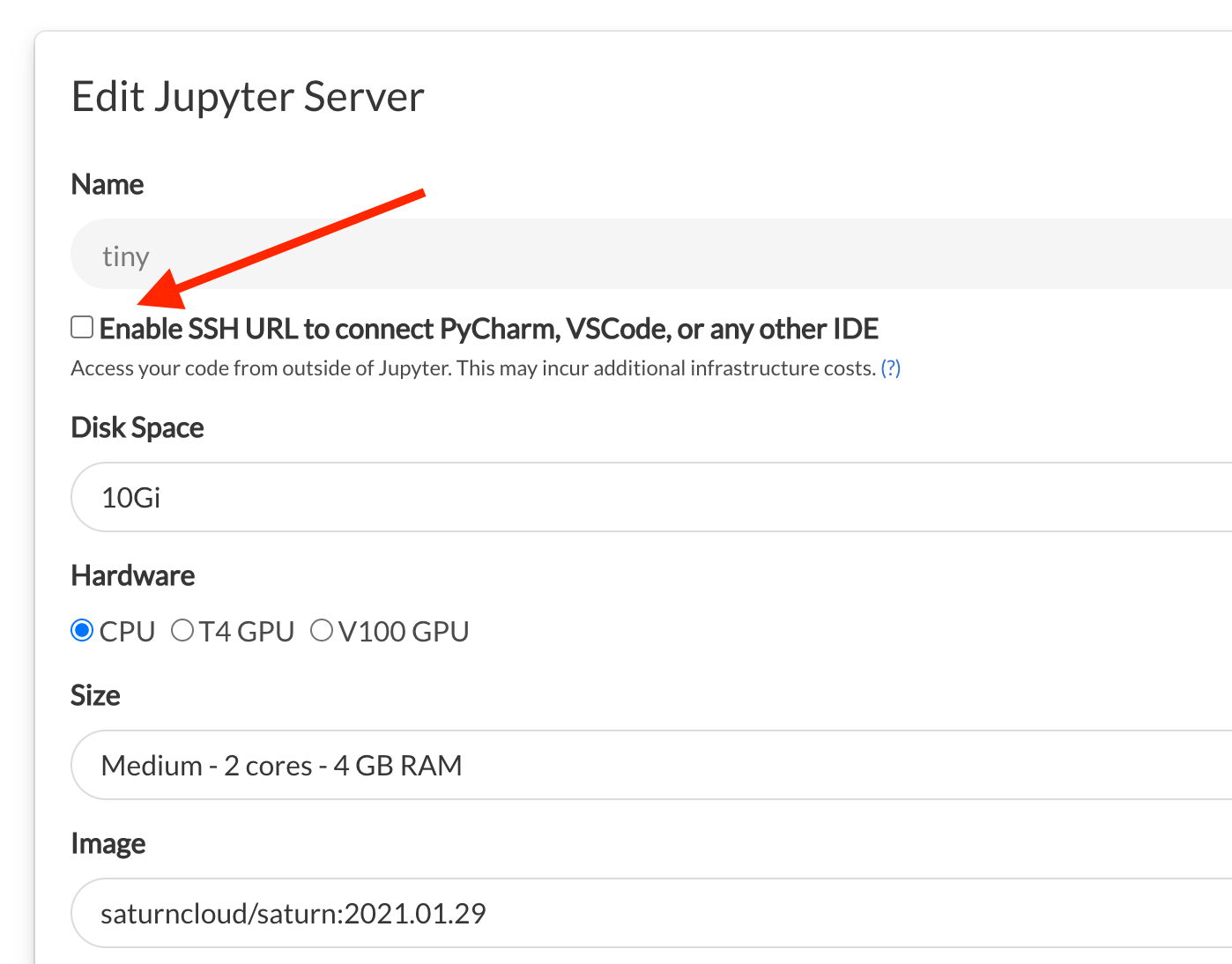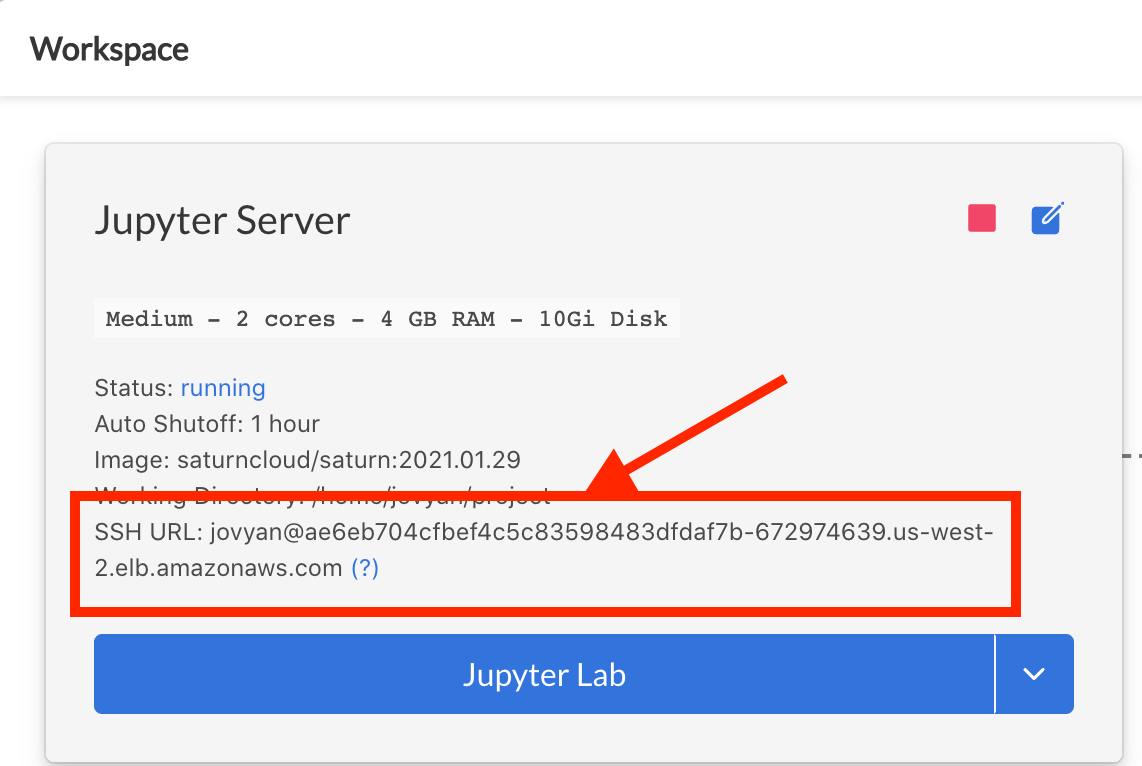Connect to a Jupyter Server With Your IDE
You might not want to use JupyterLab to interact with Saturn Cloud, so we make it easy for you to connect to your local computer IDE (such as VS Code, PyCharm, or others) as well.
Set Up SSH Keys
You will need to set up SSH to make the connection between Saturn Cloud and your laptop. Your first step is to add an SSH Public Key Credential to your Saturn Cloud account. The SSH Private Key will then stay on your laptop.
If you need help setting up a Credential, please visit our reference page about credentials in Saturn Cloud.
If you need help setting up your SSH keys on your laptop, there are some reference options elsewhere online.
Enable SSH for a Jupyter server resource
On the resource page, click the pencil/paper icon to edit the resource details. If it is running, you may want to stop it since the resource will restart itself automatically if it is running when you make this change.

You will be taken to a page that allows you to edit the settings of the server. Check the box that says “Enable SSH URL to connect to PyCharm, VSCode, or any other IDE” and click “Save” at the bottom of the page. This change will be lost if you forget to hit “Save”!

Start the Jupyter server now, and you will see an SSH URL provided on the instance’s card. You will need to provide this URL to your IDE later.

Note that this URL may change if the server is stopped, including auto-shutoff. When you start a work session, you may need to give your IDE the new URL.
IDE Specific Instructions
Now, you can set up the connection according to your preferred IDE. We have detailed instructions for a few of these below. You’ll need some common information for most, and for other IDEs not listed.
- Host: Also called “Hostname” or “Server Hostname”. This is the hostname from the Jupyter Server details (see red box in the screenshot above) - remove
joyvan@ - User:
jovyan - Private key filepath: This is the location on your computer where the SSH Private Key is stored. This is the complement to the SSH Public Key you saved on the Saturn Cloud credentials page.
VSCode
Using the Remote - SSH plugin, VS Code can connect to the Jupyter Server instance directly. To set this up, following their instructions: https://code.visualstudio.com/docs/remote/ssh
To make configuration easy, it is suggested to add an entry to your ~/.ssh/config file (create it if it doesn’t exist):
Host myjupyter
HostName <Host (see above)>
User <User (see above)>
IdentityFile <Private key filepath (See above)>
Update the name above to match your server as you see fit. Then, from the command palette (Ctrl+Shift+P or Cmd+Shift+P, depending on OS), select Remote-SSH: Connect to host…, then select your config entry (created above) from the list. Once opened, select “Open Folder”, then choose /home/jovyan, or whichever subfolder in the server you would like to view.
PyCharm
Note: this functionality is only available in the Professional edition of PyCharm - it is not available in the Community (free) edition.
To set up PyCharm to connect to a running Jupyter server, follow JetBrains’ instructions here: https://www.jetbrains.com/help/pycharm/creating-a-remote-server-configuration.html. Choose SFTP for the credentials type and create a new SSH configuration. Use the following values:
- Host: <Host (see above)>
- Port: 22
- User name: <User (see above)>
- Authentication type: Key pair
- Private key file: <Private key filepath (See above)>
- Passphrase: The passphrase to your key, if you set one
Once the new server configuration has been added, navigate to Tools > Deployment > Remote Host. From the new panel this opens, select the new server configuration you just created. This will let you browse the contents of the server, and edit the files in place. Your work is located within /home/jovyan. From Tools > Start SSH Session… a terminal can be opened to run commands.
Terminal
Using the terminal application of your choice, the server can be accessed via:
ssh <server URL>
If your key is not added to your ssh agent (or no ssh agent is running), the key can be manually specified:
ssh -i path/to/key <server URL>
Need help, or have more questions? Contact us at:
- support@saturncloud.io
- On Intercom, using the icon at the bottom right corner of the screen
We'll be happy to help you and answer your questions!
